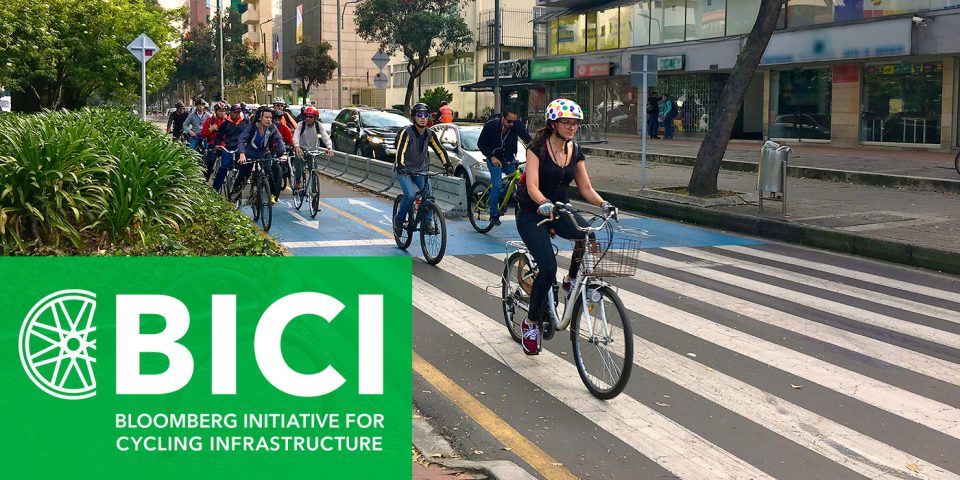Ten Cities Will Receive Up To $1 million to Implement Creative and Impactful Bike-Friendly Street Designs that Save Lives and Reduce Emissions
Bloomberg Philanthropies has launched the Bloomberg Initiative for Cycling Infrastructure (BICI), which will help ten cities around the world create safe, interconnected, and innovative cycling infrastructure which save lives and reduce emissions.
BICI will be led in partnership with the Global Designing Cities Initiative (GDCI) and in addition to receiving up to $1 million to enact their proposals, each city will also receive technical assistance from GDCI on project implementation, cycling facility design, data collection, resident engagement, and other best practices.
In parallel to the new BICI grants, iRAP is looking for partners to pilot test the new CycleRAP model offering successful grantees an evidence-based method to measure and validate the safety Star Rating of their designs and infrastructure.
This first-of-its-kind program is open to cities with over 100,000 residents and applications can be submitted between November 10, 2022, and February 3, 2023. Cities can preview the application, express interest, and sign up for application webinars to be held virtually on 1, 2 and 3 November at https://bloombergcities.jhu.edu/bici.
CycleRAP is an easy, affordable and fast method of evaluating road and bicycling infrastructure for safety. It aims to reduce crashes and improve safety specifically for bicyclists and other light mobility users by identifying high risk locations without the need for crash data.
CycleRAP will power software tools used for pinpointing and mapping where bicyclist and light mobility crashes are likely to occur. The model uses data about the features of a road, street or path to evaluate the risk of crashes for bicyclists and light mobility users—irrespective of the type of facility (or whether it is on or off road) and for all crash types. It can be used anywhere in the world.
Making cycling in cities easier for residents will help reduce greenhouse gas emissions, strengthen public health, and increase economic opportunities. But for that to happen, cities need to deliver infrastructure that makes cycling safer and more accessible — and Bloomberg Philanthropies is glad to help them do it,” said Michael R. Bloomberg, founder of Bloomberg LP and Bloomberg Philanthropies and 108th mayor of New York City, who announced the launch of Bloomberg Initiative for Cycling Infrastructure at Bloomberg CityLab 2022. “At a time when many cities are struggling to revive downtown areas, investing in safe, clean, and accessible transportation options will serve as a catalyst for progress.”
“Investments in safe and accessible bike lanes are investments in the health, sustainability and economic future of the planet,” said Janette Sadik-Khan, Principal for Transportation at Bloomberg Associates and former commissioner of the New York City Department of Transportation. “Cities need people-first infrastructure, not just megaprojects that move cars, and this program will roll out life-saving street designs and roll back the emissions that are threatening the globe.”
Successful cities need transportation systems that allow people to move safely, efficiently, and sustainably. Comprehensive cycling networks can meet these needs while also improving public health and wellbeing. Research consistently shows that building cycling infrastructure also provides social benefits that are orders of magnitude beyond their investment and that people who cycle are healthier and happier. However, a significant barrier to cycling in many cities is the lack of safe cycling infrastructure. BICI is designed to help city leaders meet the urgent need to build more connected and expansive cycling infrastructure that serves as many residents as possible.
‘When it comes to cycling infrastructure, every city is unique,” said Skye Duncan, executive director of GDCI. “But the need for enhanced cycle networks that are safe, protected, and connected for all ages and abilities is universal. Whether a city already has world-class facilities or is beginning its journey to improve cycling, we’re looking forward to working with the selected cities that are ready to rethink their streets through implementing and scaling their local cycle networks. GDCI is looking forward to bringing years of bicycle infrastructure experience to our collaboration with cities as part of BICI.”
The selected ten cities will be announced in the Spring of 2023 and BICI will give them the opportunity to not only advance cycling locally, but to also join a global network of peers from whom to learn how to advance global cycling best practices. Formal technical assistance and other program supports, including convenings with other winning cities, will begin in the Summer of 2023, continuing for up to three years.
For more information on BICI, click HERE.
For more information on CycleRAP, click HERE.

















